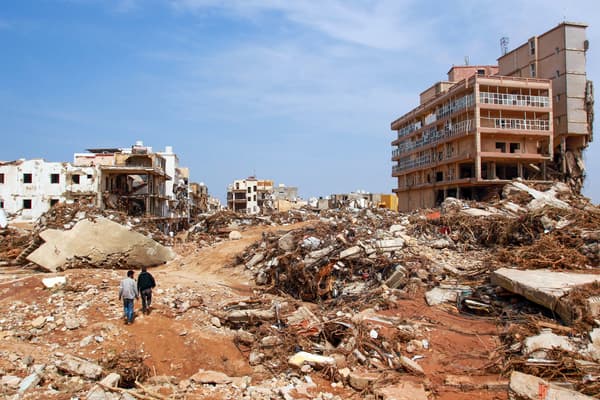“Hope is there.” Tamer Ramadan of the International Federation of Red Cross and Red Crescent Societies is the head of aid operations in Libya. During a press conference in Geneva, live from Cairo, he expressed a kind of optimism.
Emergency services have their sights set in particular on the city of Derna, where entire blocks of houses were swept away overnight from Sunday to Monday by a seven-metre-high wall of water, when two obsolete dams suddenly gave way after heavy rain. torrential.
“There is still hope of finding people alive,” said Tamer Ramadan of the International Federation of Red Cross and Red Crescent Societies during a press conference in Geneva, live from Cairo.
The Libyan Red Crescent indicated that the human toll currently exceeds 11,000 dead and more than 10,000 missing. Local authorities, for their part, report at least 3,800 deaths.
Very difficult rescue operations
Torrential rains and flooding have washed away much of the road infrastructure (roads and bridges), making access even more difficult. Not to mention that the organization of aid becomes more complex due to the chaotic political situation in the country.
Indeed, Libya has been in chaos since the death of dictator Muammar Gaddafi in 2011, with two rival governments, one recognized by the UN based in the capital Tripoli in the west, and the other in the eastern region, affected because of the floods.
“I think the problem for us in Libya is, of course, coordinating our efforts with the government and then with other authorities in the east of the country,” said Martin Griffiths, the U.N. emergency chief.
A solution for access by sea
This is the solution proposed by the mayor of Derna to help the victims. While the solution is welcome and “makes sense” to the UN, Martin Griffiths nevertheless insists that the best strategy is “not to choose one approach over another.”
It is important to continue by land or “find people who have fled from Derna, towards the south (…) and they will also need help,” he insisted.

The UN recalls that it has deployed a team of specialists in humanitarian aid coordination, made up of fifteen people, from Morocco to Libya. On the other hand, he refused to give an assessment of the number of deaths, “which would be neither definitive nor precise.” Yesterday, the mayor of Derna estimated that the potential death toll could be around 20,000.
Source: BFM TV


